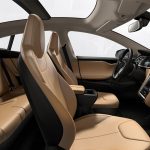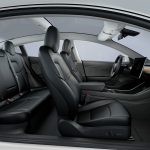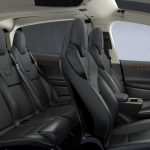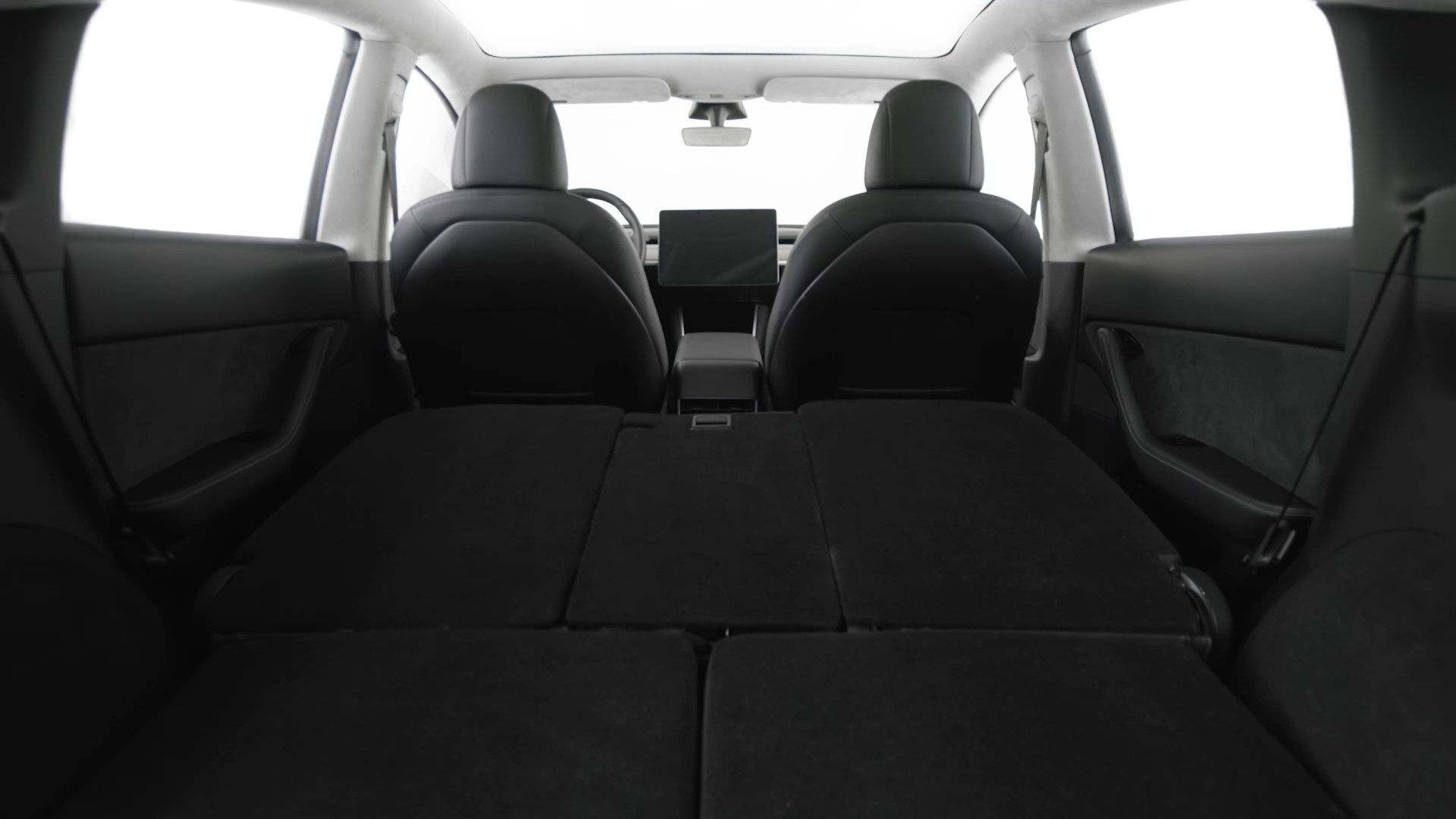
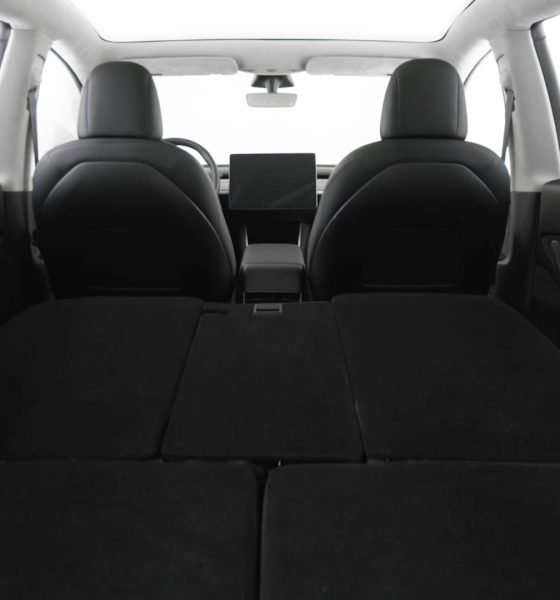
News
The Model Y’s glass roof is Tesla’s best yet, and it can redefine car camping trips
Teslas are known for many things: their quickness in 0-60 mph sprints, their dominance in drag races, their extended range, their Supercharger Network, and lately, even their proficiency on the track. Apart from these, Teslas are also known for their futuristic interiors, which are represented perfectly by the vehicles’ stunning glass roofs.
The glass roofs on the Model S, Model X, and Model 3 today make the vehicles extraordinarily airy and spacious, and for a good reason. While it’s true that the glass roofs provide Tesla’s electric cars a lot of natural light, they also help optimize the space in the cabin, adding precious centimeters’ worth of headroom for passengers. Safety tests have also proven that Tesla’s glass roofs are durable, with the Model 3’s roof withstanding over 20,000 lbs of force during the NHTSA’s evaluation.
Tesla’s penchant for equipping its vehicles with glass roofs started with the Model S, the company’s first EV that it designed from the ground up. The large premium sedan’s glass roof proved popular among buyers, though a good number of Model S owners preferred the convenience of a panoramic sunroof instead. Between the two, the Model S’ sunroof provided more utility, though it also required having a bar across the sedan’s otherwise seamless roof.
- (Credit: Tesla)
- (Credit: Tesla)
- (Credit: Tesla)
The Model X is Tesla’s largest vehicle, and it comes with arguably one of the most massive windshields among SUVs available today. Just like the Model S with sunroofs, however, the Model X’s roof also provides a somewhat obstructed view, thanks to the mechanism of its Falcon Wing Doors. The Model 3 is quite the same, with its glass roof being slightly obstructed by a bar that runs between its B-pillars.
The Model Y, on the other hand, seems to be equipped with Tesla’s best glass roof yet, hands down. Teaser images and videos of the Model Y’s interior show a seamless glass roof that’s quite similar to the Model S, offering passengers a completely unobstructed view from the cabin. But unlike the Model S, the Model Y is designed for the mass-market, which means that it is priced far more aggressively than the flagship sedan.
Both are sickkkkk! Here's the panoramic glass roof on @Tesla Model Y!! $TSLA #Tesla #ModelY #EV @elonmusk
😍⬇️ pic.twitter.com/xZ3o5rE4RJ— Tesla New York (@TeslaNY) August 10, 2019
The Tesla Model Y starts at $52,990 for a Long Range Dual Motor AWD variant. For that price, buyers of the vehicle will get a crossover with 66 cu ft of space for cargo, a 315-mile EPA range, basic Autopilot, and a glass roof that spans the vehicle’s entire cabin. Considering the Model Y’s designation as a crossover, its roof alone would make it the best camping vehicle, hands down.
Tesla has rolled out a Camp Mode feature for its vehicles, providing owners with a way to sleep comfortably in their electric car overnight. The feature even comes with an Easter Egg within an Easter Egg in the form of a Cybertruck. With Camp Mode engaged, Tesla enthusiasts can spend the night in their Model Y with a full view of the sky above, all while enjoying a cabin that’s adjusted for the perfect temperature.
That’s a combination that’s pretty hard to beat in terms of comfort and cool factor. It does, in a way, transform the Model Y into a spacious, reasonably priced, mobile hotel room of sorts, providing car campers with protection from the elements and a killer view of the outside.

News
Tesla ships out update that brings massive change to two big features
“This change only updates the name of certain features and text in your vehicle,” the company wrote in Release Notes for the update, “and does not change the way your features behave.”

Tesla has shipped out an update for its vehicles that was caused specifically by a California lawsuit that threatened the company’s ability to sell cars because of how it named its driver assistance suite.
Tesla shipped out Software Update 2026.2.9 starting last week; we received it already, and it only brings a few minor changes, mostly related to how things are referenced.
“This change only updates the name of certain features and text in your vehicle,” the company wrote in Release Notes for the update, “and does not change the way your features behave.”
The following changes came to Tesla vehicles in the update:
- Navigate on Autopilot has now been renamed to Navigate on Autosteer
- FSD Computer has been renamed to AI Computer
Tesla faced a 30-day sales suspension in California after the state’s Department of Motor Vehicles stated the company had to come into compliance regarding the marketing of its automated driving features.
The agency confirmed on February 18 that it had taken a “corrective action” to resolve the issue. That corrective action was renaming certain parts of its ADAS.
Tesla discontinued its standalone Autopilot offering in January and ramped up the marketing of Full Self-Driving Supervised. Tesla had said on X that the issue with naming “was a ‘consumer protection’ order about the use of the term ‘Autopilot’ in a case where not one single customer came forward to say there’s a problem.”
This was a “consumer protection” order about the use of the term “Autopilot” in a case where not one single customer came forward to say there’s a problem.
Sales in California will continue uninterrupted.
— Tesla North America (@tesla_na) December 17, 2025
It is now compliant with the wishes of the California DMV, and we’re all dealing with it now.
This was the first primary dispute over the terminology of Full Self-Driving, but it has undergone some scrutiny at the federal level, as some government officials have claimed the suite has “deceptive” names. Previous Transportation Secretary Pete Buttigieg was one of those federal-level employees who had an issue with the names “Autopilot” and “Full Self-Driving.”
Tesla sued the California DMV over the ruling last week.
News
Tesla workers push back against Giga Berlin unionization
“IG Metall did not succeed in Giga Berlin‘s works council election earlier today. The union share was reduced from nearly 40% in 2024 to 31% in 2026! This is a clear message by the Giga Berlin team towards an independent co-determination! The list called Giga United, led by the current chairwoman, Michaela Schmitz, received the most votes with more than 40%! Good news for Giga Berlin!”

Tesla workers pushed back against unionization efforts at Gigafactory Berlin, and over the past few years, there has been a dramatic decrease in interest to unionize at the German plant.
Gigafactory Berlin Plant Manager André Thierig announced on Wednesday that IG Metall, the European union group, saw its share reduce from 40 to 31 percent in 2026 as employees eligible to vote on the issue. Instead, the Giga Berlin team, known as Giga United, received the most votes with more than 40 percent.
BREAKING! 🚨
IG Metall did not succeed in Giga Berlin‘s works council election earlier today. The union share was reduced from nearly 40% in 2024 to 31% in 2026!
This is a clear message by theGiga Berlin team towards an independent co-determination!
The list called Giga…
— André Thierig (@AndrThie) March 4, 2026
Thierig gave specific details in a post on X:
“IG Metall did not succeed in Giga Berlin‘s works council election earlier today. The union share was reduced from nearly 40% in 2024 to 31% in 2026! This is a clear message by the Giga Berlin team towards an independent co-determination! The list called Giga United, led by the current chairwoman, Michaela Schmitz, received the most votes with more than 40%! Good news for Giga Berlin!”
There were over 10,700 total employees who were eligible to vote, with 87 percent of them turning out to cast what they wanted. There were three key outcomes: Giga United, IG Metall, and other notable groups, with the most popular being the Polish Initiative.
The 37-seat council remains dominated by non-unionized representatives, preserving Giga Berlin as Germany’s only major auto plant without a collective bargaining agreement.
Thierig and Tesla framed the outcome as employee support for an “independent, flexible, and unbureaucratic” future, enabling acceleration on projects like potential expansions or new models. IG Metall expressed disappointment, accusing management of intimidation tactics and an “unfair” campaign.
The first election of this nature happened back in 2022. In 2024, IG Metall emerged as the largest single faction with 39.4 percent, but non-union lists coalesced for a majority.
But this year was different. There was some extra tension at Giga Berlin this year, as just two weeks ago, an IG Metall rep was accused by Tesla of secretly recording a council meeting. The group countersued for defamation.
Tesla Giga Berlin plant manager faces defamation probe after IG Metall union complaint
This result from the 2026 vote reinforced Tesla’s model of direct employee-management alignment over traditional German union structures, amid ongoing debates about working conditions. IG Metall views it as a setback but continues advocacy. Tesla sees it as validation of its approach in a competitive EV market.
This outcome may influence future labor dynamics at Giga Berlin, including any revival of expansion plans or product lines, which Musk has talked about recently.
News
SpaceX President Gwynne Shotwell details xAI power pledge at White House event
The commitment was announced during an event with United States President Donald Trump.

SpaceX President Gwynne Shotwell stated that xAI will develop 1.2 gigawatts of power at its Memphis-area AI supercomputer site as part of the White House’s new “Ratepayer Protection Pledge.”
The commitment was announced during an event with United States President Donald Trump.
During the White House event, Shotwell stated that xAI’s AI data center near Memphis would include a major energy installation designed to support the facility’s power needs.
“As you know, xAI builds huge supercomputers and data centers and we build them fast. Currently, we’re building one on the Tennessee-Mississippi state line. As part of today’s commitment, we will take extensive additional steps to continue to reduce the costs of electricity for our neighbors…
“xAI will therefore commit to develop 1.2 GW of power as our supercomputer’s primary power source. That will be for every additional data center as well. We will expand what is already the largest global Megapack power installation in the world,” Shotwell said.
She added that the system would provide significant backup power capacity.
“The installation will provide enough backup power to power the city of Memphis, and more than sufficient energy to power the town of Southaven, Mississippi where the data center resides. We will build new substations and invest in electrical infrastructure to provide stability to the area’s grid.”
Shotwell also noted that xAI will be supporting the area’s water supply as well.
“We haven’t talked about it yet, but this is actually quite important. We will build state-of-the-art water recycling plants that will protect approximately 4.7 billion gallons of water from the Memphis aquifer each year. And we will employ thousands of American workers from around the city of Memphis on both sides of the TN-MS border,” she noted.
The Ratepayer Protection Pledge was introduced as part of the federal government’s effort to address concerns about rising electricity costs tied to large AI data centers, as noted in an Insider report. Under the agreement, companies developing major AI infrastructure projects committed to covering their own power generation needs and avoiding additional costs for local ratepayers.
